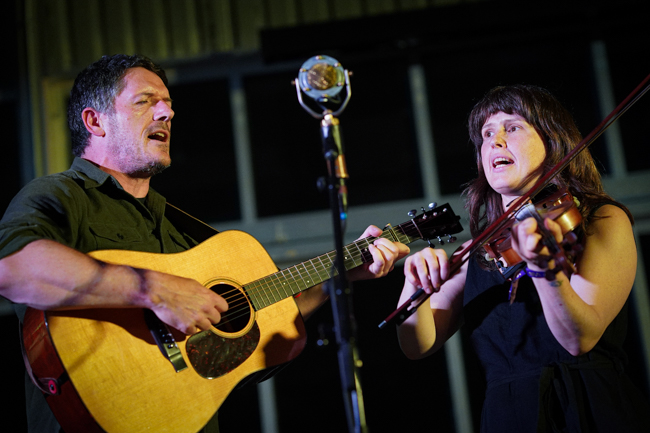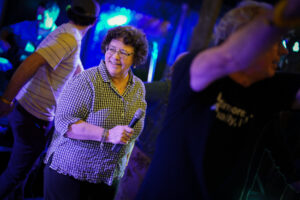This overview of the 2024 Baltimore Old Time Music Festival is a contribution from photojournalist and writer Casey Vock. All photos are copyright Casey Vock.
More than 1,500 people from 26 different states made their way to the fifth annual Baltimore Old Time Music Festival, bringing pickers, fiddlers, and players of all stringed instruments to rejoice along the waters of the Charm City’s Inner Harbor on April 19 and 20.
A convincing demonstration of the city’s thriving old time and roots music scene, the Old Time Music Festival saw attendance more than triple from 2023 as it packed the Baltimore Museum of Industry (BMI) in the first year at its new location after four memorable years at Creative Alliance.

Presented by the Center for Cultural Vibrancy and hosted by father-son duo Ken and Brad Kolodner, this year’s event boasted a lineup of high-profile artists and groups both honoring the traditions of old time and seeking to broaden them.
BMI and its astonishing collection of artifacts set a remarkable scene that grew to life with performances early Friday evening on the Harborview and Pavilion stages, each presenting splendid views of the Inner Harbor and famous landmarks, like the Domino Sugar sign glowing just to the southeast.
Saturday afternoon brought a loaded schedule of not only live music, but workshops, presentations, and open jam sessions in any nook and corner of the museum, and outside on its docks, too, where old pals reconnected and total strangers became friends as they played underneath the warm sun all day long.
“We’re clearly witnessing a huge period of growth for our old time community,” said Brad Kolodner, who’s a member of numerous Baltimore-based string bands, and, as he does each spring, performed alongside his dad at this year’s festival.
“This marks ten years that my father and I have been organizing events, square dances, jams and concerts, and this is the culmination of those efforts and work done behind the scene as well. We know that this is already a landmark event for Baltimore, but we took it to another level this year thanks to so much support, the amazing venue, and of course the artists, who were incredible.”
Incredible Artists



Ascending Seattle-based string band The Onlies headlined both nights, and served up numerous delightful sets across Friday and Saturday, as did Allison de Groot & Tatiana Hargreaves, the Horsenecks, and Bruce Molsky, a widely respected fiddler, banjoist, guitarist, vocalist, and educator.
“This festival brought together all the most positive and wonderful aspects of roots and old time music,” said Molsky, who has recorded and performed with a long list of legendary musicians.
“It really represented all the things I love about this music, including the community. The cross-section of music and kinds of musicians that Brad and Ken programmed was kind of perfect.”
From Africa to Appalachia

From Africa to Appalachia, one of the weekend’s most anticipated acts, is the fascinating project featuring Grammy-nominated Malian master griot Cheick Hamala Diabate, old time banjo player Riley Baugus, and multi-instrumentalist Danny Knicely.
Through its uncommon blend of sound and perspective, the dynamic group illustrates and educates on the historical connection between West African and Appalachian music, a theme crucial to the Baltimore Old Time Music Festival.
“This band — these people — is my heart,” said the inspirited Diabate as he detailed his adventures in America, where he’s worked with star musicians and been cast in major motion pictures.
Diabate mesmerized with blazingly fast fingers on the ngoni, and played his custom gourd banjo that was handcrafted by Baltimore’s own Pete Ross, whom he met for the first time at the event.

In each of his unforgettable appearances, Diabate riveted with stories and offered advice to concert goers. Presenting a session on Old Time Roots, he spoke alongside modern-day old time pioneer Dom Flemons—a co-founder of the award-winning Carolina Chocolate Drops, and himself a Grammy nominee who delivered two unforgettable performances on Saturday. Diabate and Flemons were joined by Caymanian fiddler Samuel Rose of the Swanky Kitchen Band.
Old Time Dance Traditions
Another spectacular presence at the event, Becky Hill is a percussive dancer, choreographer, square dance caller, and educator who has focused her research on Appalachian percussive dance, flat footing, and clogging. She considers the old time space one where dancers are an equal part of the conversation with instrumentalists.

As a performer on both Friday and Saturday at the festival, Hill displayed her interest in the intersections of clogging, flatfooting, and tap dance. To do so, she invited tap dancer Roxy Hill to join her at BMI, where they used old time sounds to examine the relationship between the different dance styles.
“They’re all American roots percussive dance forms. Both tap and flatfooting originated here, and are unique to this complicated melting pot of the US … To have the space to present our dance dialogue on stage feels really significant,” Hill said.
“It opens up new audiences for both tap dancing and flatfooting and it shows that there’s connective tissue across music and dance genres in the US … In particular, what the festival is doing with the Center for Cultural Vibrancy is to expose that connection between all different aspects of old time music.”
Dance, as it is each year, was a primary feature of the latest Old Time Music Festival, and the two days were capped with a jubilant old fashioned Baltimore square dance that twirled and howled into the late hours on Saturday night.

The lively affair took over the pavilion as hundreds of attendees let loose with friends and family. Veteran caller Janine Smith, who’s stoked many Charm City celebrations, led the way with the help of the Horsenecks and other performers from the lineup before all the artists on site joined together to close out the special occasion.
For Molsky and others deep into their careers, the festival provided a refreshing post-pandemic chance to catch up with longtime friends forged on the old time touring circuit, but also to interact with festival goers themselves.
“This kind of music isn’t the thing where a big star is sequestered until they walk out on stage,” he said. “Part of it is walking out there and remembering people’s names and getting to know them. I don’t consider that to be work. I love that.”
Molsky lived in the DC area for years and spent time in Baltimore, but he was impressed by what he sees as an undeniable “vibrancy” in the Charm City’s music landscape and its people.
“I think Brad has a lot to do with that,” he said. “When somebody walks up to me and says, ‘hey man, I’ve been listening to your music for 20 years, it’s so nice to meet you in person,’ I’m moved by that. This festival was just a great festival for meeting people.”
Beyond introducing artists to listeners, the Kolodners intentionally designed the event to help cutting-edge musicians show what they’re doing to expand the traditional confines of the old time genre.



“It’s going to grow into something beautiful, and it already is,” Hill observed.
“It’s unique because it highlights all the different ways that this tradition is evolving, by not only celebrating its roots, but by having new conversations within it, too, like what Tatiana and Allison are doing, or like Roxy and myself. We’re pushing the boundaries and we’re experimenting within the structures that old time music provides. And I think that is part of how vernacular music traditions keep evolving.”
With its 2024 version in the books, the Old Time Music Festival has firmly established itself as one of the fastest growing and most influential gatherings of its kind anywhere in the country.
Eyeing sustainable growth and a balance of honoring and augmenting old time customs, the Kolodners are optimistic for what the future holds.
“We’re pleased to make so much progress, to create an enriching experience for everyone involved, and we’re thrilled to be at BMI for years to come,” said Brad Kolodner.

“We’re proud of the intergenerational aspects we’ve built into it. We offer children’s programming and make it free for families, all with the hope that we can keep driving interest and participation in old time moving forward. Above all, we aim to celebrate diversity and the true roots of this music through the performers we invite to be here with us.”
Be sure to save the date for next year’s Baltimore Old Time Music Festival, which will return to BMI on April 18 and 19, 2025. For more information, visit the festival online.



